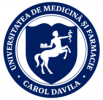ApGenEdu Project
Project presentation
Context
The following context is valid in Romania at the time of the writing of this project and has a determining factor in project development:
- the insufficient number of physicians that use medical genetic factors in their practice
- the discrepancy between the number of genetic epidemiologists in Romania and the need for genetic data usage in Romania
- the existence of all curricula for applied genetic epidemiology studies in the current educational offer of UMF, but without a course that shows how these elements can be tied together
- the existence of the local SMEs focused on research and data analysis activities
- the existence of successfully completed projects that addressed the analysis of Romanian genetic data, obtained from previous EAA-funded projects (e.g. ROMCAN)
- existence of local specialists from the academic world with experience in applied genetic field.
Current Problems
Current problems that have been identified:
- the lack of a unified educational frame, adding together the existing expertise
- the lack of a formal direction of integrated studies that facilitates the appearance in Romania of a personalized/precision medicine approach
- the lack of genetic screening addressed to the Romanian population due to the low numbers of specialists in this field
Project Objectives
The project aims to bring a new perspective in the area of study programmers and modules for initial and continuous training.
The project aims to develop and deliver an integrated curriculum bringing together the applied medical genetic disciplines, in order to provide students with the abilities to work in the future in this field of science or to introduce applied genetic methods in their professional activities. Once developed and delivered in an in-person session, the materials will be transferred on-line becoming accessible to students and the medical community as an e-learning module. The curriculum will remain available for UMF as a potential optional training.
In this context, the project objectives are:
- development of the first applied medical genetic course for UMF, putting together the existing capabilities and adding new knowledge acquired from partner institutions. The curriculum will be provided as 1 training workbook and delivered in two different ways:1 instance of in-person delivery, followed by 2 successive instances of on-line training.
- development of a teaching team able to deliver the training of applied genetics, which includes 16-18 persons from the project participants.
- development of new knowledge and skills related with applied medical genetic research, at student level, to encourage them to follow a career in this area or to use the results in their medical profession, by training 130 persons, 30 in summer school and 100 on e-learning module
- development of new skills related with data analysis for research projects and scientific publishing for the next generation of researchers
Target Groups
The project target groups are medical students, mostly from the terminal years of study, together with young professionals from healthcare industry, interested in applied medical genetic field. The project will also be open to students at Reykjavik University, in fields such as Biomedical Engineering or Computer Science, who are interested in biostatistics or bioinformatics.
Result Description
We can group the output results of the project in two different categories:
1. Educational outputs:
- development of the integrated curriculum for applied genetic studies
- delivery of the content by developing and adjusting the content specific for summer school delivery
- delivery of the content by developing and adjusting the content specific for e-learning.
Each training instance will end with a capstone project. A reward system for the best capstone project will exist, for the best ranking student team following either method of delivery, designed to encourage cooperation and competition between teams
2. Scientific outputs:
- one methodological publication on the particularities of implementing such a curriculum in Romania and best practices
- one scientific publication on epidemiology of hypertension in Romania (GWAS study), as a joint study (RU/UMF/ExigiaMedical)
- at least 5 scientific papers, that will be presented at medical congresses or conferences, investigating the applied genetic studies in the field of Urology and Gastroenterology
Impact and Long-Term Benefits
We are looking forward to providing three long-term benefits:
- inception of the development of a new generation of scientists in the field of genomic sciences, by initiating a first interdisciplinary course
- initiation of the development of the abilities to integrate genomic components into the day-to-day medical activities
- contribute to the development of the future educational offer of UMF, by preparing an interdisciplinary curriculum in genomic related area of study.
